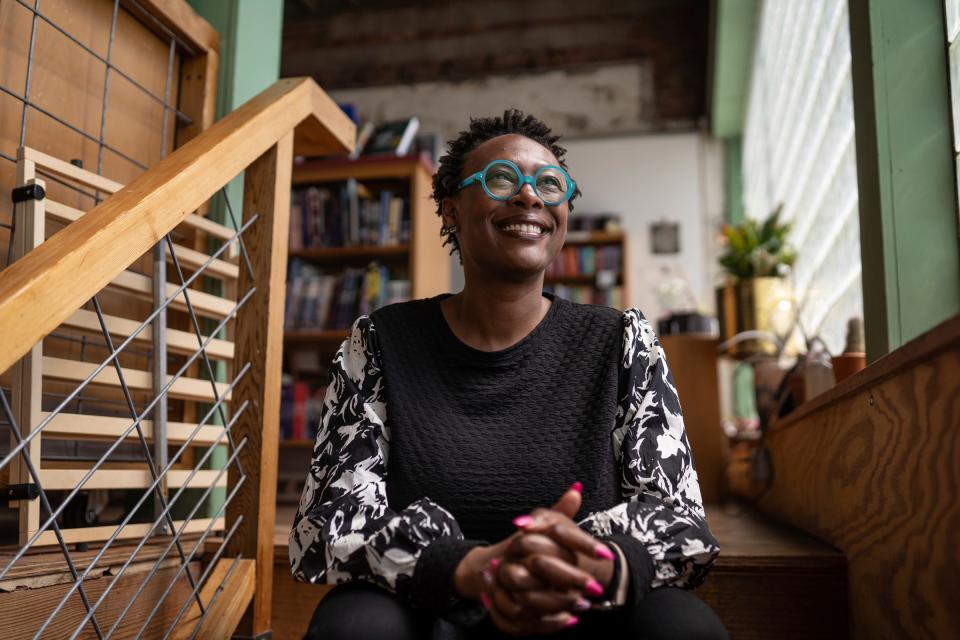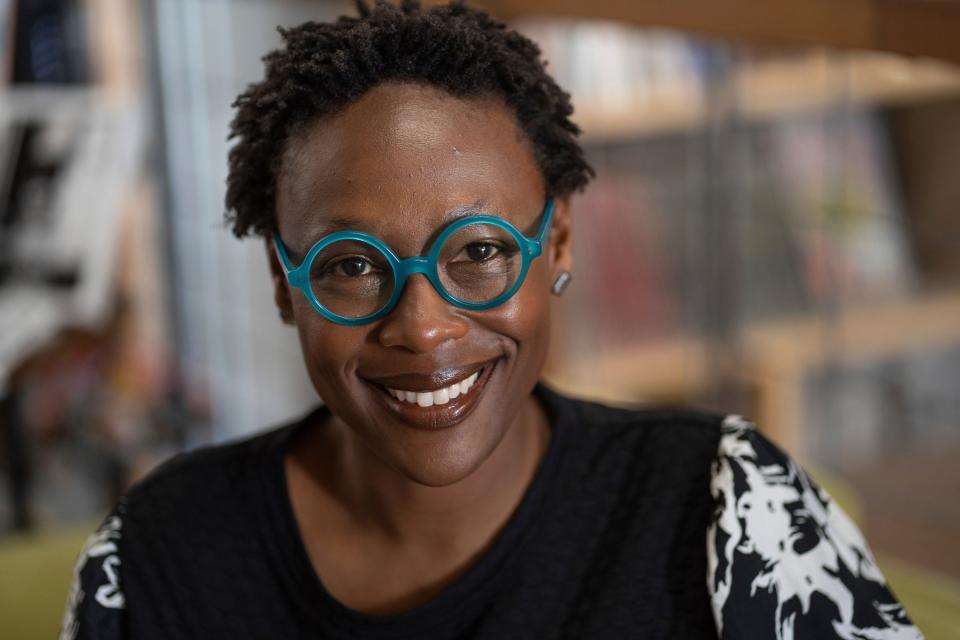Meet Nandi Comer, Michigan's first poet laureate since the 1950s
Michigan is about to meet Nandi Comer, the state's first poet laureate in more than 60 years.
But those who already know Comer celebrated her appointment announced by the Michigan Department of Education in a release last week. The day after the announcement, one person stopped by to congratulate Comer while the Free Press caught up with her over coffee.
Michigan's first — and only until Comer's appointment — poet laureate was Edgar Guest, a former syndicated poet for the Free Press who held the title from 1952 until his death in 1959. For years, legislative efforts to name another poet laureate failed until lawmakers approved Gov. Gretchen Whitmer's request to fund the position.
Comer, an award-winning writer, grew up in Detroit, graduated from the University of Michigan with a bachelor's degree in English and Spanish and has served as a writer-in-residence in Detroit Public Schools and community centers. As poet laureate she'll share her work with the public and is expected to travel the state, visiting classrooms and libraries to promote the literary arts.

Comer shared her approach to poetry and her vision for her new role with the Free Press. The conversation has been edited for clarity and length.
More: Michigan names first state poet laureate since 1950s
More: Michigan to name poet laureate after spending more than $67K meant to fund position
Free Press: So I wanted to start with just your own path to poetry. When did you first start writing poems? How did you get interested in literary arts? What were sort of your early exposures to the art form that (were) really memorable for you?
Comer: So my family always talks about me being a contemplative kid. ... My mother bought me a journal really early. ... But it really wasn't until I was in high school when my teacher at Communication and Media Arts High School was Terry Blackhawk, who was the founder of InsideOut Literary Arts Project. And prior to establishing InsideOut, she had been really invested in bringing professional writers in the classrooms. ... And so she just brought all these really amazing writers in and we were doing all these activities and then she asked me if I wanted to come to her creative writing class, and ever since then, I've just been really interested in writing and in poetry and how to push my poetry to do more.
What does it look like for your poetry to do more? What does that mean to you?
So I'm always very interested in what us poets call the lyric. And so I'm really interested in sonic devices and depth: How does a line from poetry work to create a lot of meaning? When I'm constructing the lines, I really like for my poems to be accessible. Lately, I've been thinking about how poetry can serve history. So I've been writing a lot about not only … current events that have been happening in our day-to-day, but historical events. ... I think poetry can be used for a lot of things like it can be used to try to understand a topic that we're trying to grapple with. It can also be used for celebration. And so I'm always wondering, how can this poem — even if I'm writing about my own personal experience — be a way of tapping into what someone needs to hear? Or what someone didn't know they needed to hear until I was able to put a name to it?
What do you think the roles of a state poet laureate are and what do you want them to be?
I think the best way that a poet laureate can serve the state is to be committed to having space for poetry to be in our everyday lives. And so if it means being at schools and being in libraries or having creative, innovative ways of displaying poetry, I think that the poet laureate has this really unique role to play. ... I think people think of the poet laureate as this traditionalist who stays in their office and just writes poems and only gets called out during the diplomatic moments of importance. … For me, I want the poet laureate position to be an accessible position. ... One of the things that I am really looking forward to is being in schools and further extending my practice of kind of sharing my joy for poetry with youth.
And you've already done quite a bit of that. You've spent a lot of time in the classroom. What stands out from your interactions using poetry to connect with young people?
It’s really hard to narrow down what stands out. … First of all, working with anyone — it doesn’t matter if they’re young or old — I think I will say my favorite moments are when I am interacting with someone who is a cynic who doesn't think poetry can do anything for them and that there is no space for poetry. And I kind of make them my goal, like they're my goalpost in a sense. Because I think that... if you give someone a space — even if you just give them a white page to do whatever they want with it — they will find some way, they'll find something that they wanted to say that they weren't able to say until you said, 'Hey, here's permission, just do it. Just, here's an hour, that's all we're going to do.' But also, I think there's a poem for everyone.

So I wanted to learn just a little bit more about your writing process. What are your routines around writing?
I'm a daily writer. I am usually up by 5 or 6 in the morning. ... I really tend to like a lot of silence around me and I still handwrite. I hand compose the first couple of ideas. But I also am very forgiving of myself ... just because I'm writing every day doesn't mean that I'm like finishing my next great poem every day. No, I mean, every day I am trying to just engage in the contemplative practice. Sometimes, it's literally just me free writing for 10 minutes about how I haven't written anything in a while. I don't put a lot of pressure on myself, but I do give myself intensive moments like I may go on a retreat or something to do some intensive revision work just depending on what kind of project I'm working on.
One thing that just stands out with your appointment is how long it's been since the last time Michigan had a poet laureate. What do you think the state lost in all those decades without someone in that role?
Michigan is a really big poetry state. Michigan poets have been just really blowing the rest of the country out of the box, like every year, a Michigan poet takes home a really big award. ... I don't think that we have lost the ability to engage on the national and international field. I think probably just this way of engaging the whole state in what we're already doing. ... I think it's worth it to invest in having someone responsible for reminding folks that poetry — while we get called on during all the important moments of our lives, the wedding, the births, the funerals, we get called to inaugurations, we get called to put words to the importance of our events — that also poems are part of the everyday life, right? And I think the poet laureate position can really … be that for the community. I think that if … assigned to the right people, it can move from that writer in the castle, distant from everyone, to someone who is actually involved in the community and engaging with the community and inspiring the communities to engage in the practice as well.
Do you feel any sort of weight in terms of being the first in so many years?
That's an understatement. Michigan has a legacy that is so important to American letters. Robert Hayden — who was originally from Detroit and later taught at the University of Michigan — he was the first consultant of poetry to the Library of Congress. That position later became the poet laureate of the nation. So I, in a way, I think I'm trying to learn from other poets who have taken on these big lofty weights. And I really am meditative and thinking about not only what does it mean to be a part of like the first after so long and the second in the history. But I think what's more important is how do we invest in making sure this still continues? I don't want to be the second poet laureate like Michigan only had two. That's not a good legacy. I would love for us to have an investment in the arts. That places the kind of importance on this, so that … the next 50 years, the next 60 years, I can look back and say, 'Oh, we had like 20, 30 poet laureates, and look what they've done. Right?' That, to me, is the weight that I'm carrying right now.
Clara Hendrickson fact-checks Michigan issues and politics as a corps member with Report for America, an initiative of The GroundTruth Project. Make a tax-deductible contribution to support her work at bit.ly/freepRFA. Contact her at chendrickson@freepress.com or 313-296-5743. Follow her on Twitter @clarajanehen.
This article originally appeared on Detroit Free Press: Q&A with Nandi Comer, Michigan's new poet laureate

